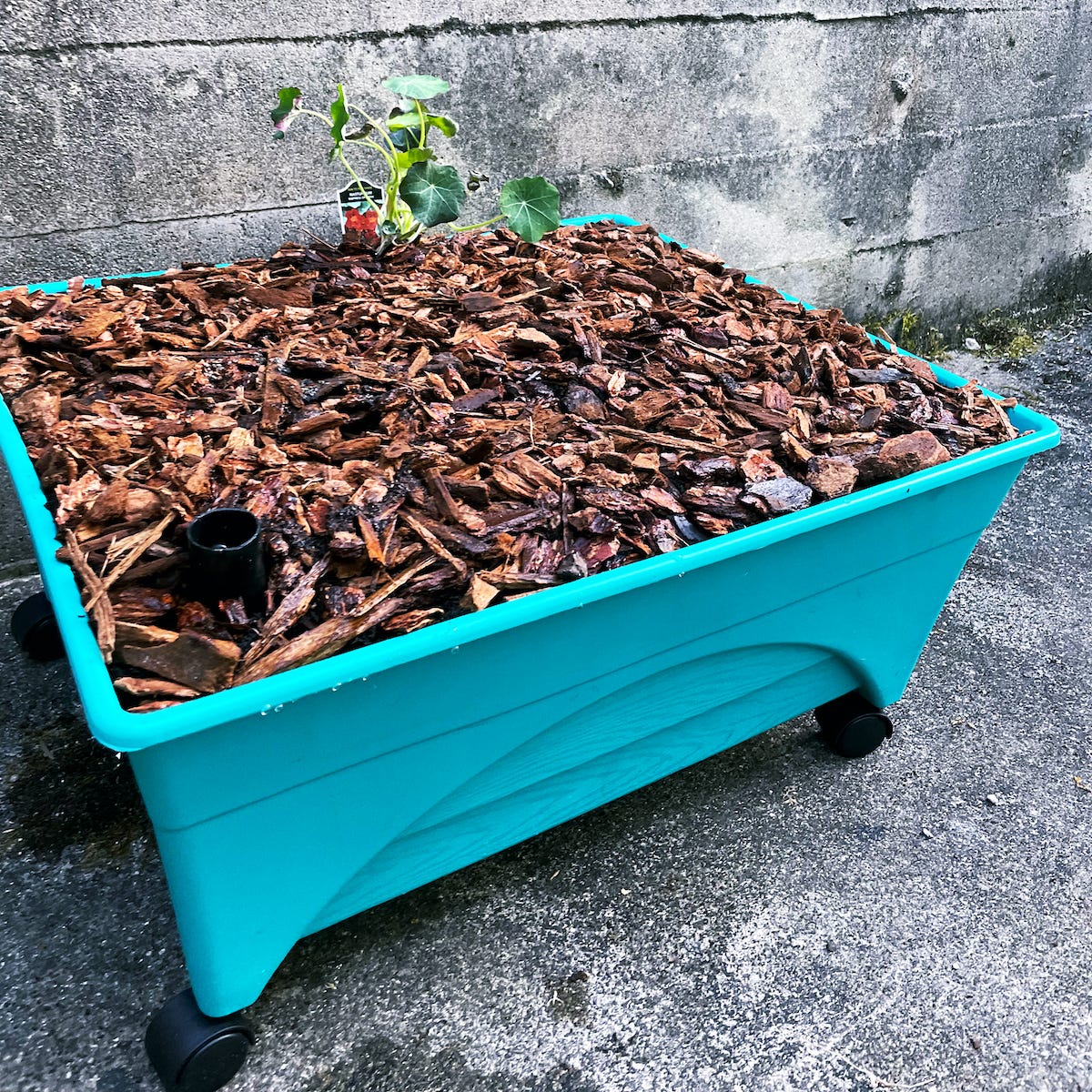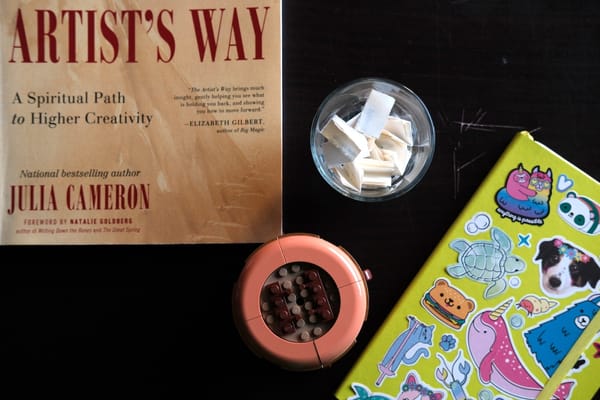How do you ideate?
It’s time to simplify things

📝 Notes from Jenn:
It’s my birthday week! I took Monday and Tuesday (my birthday) off to make it a long weekend. If you’re in the gifting mood, upgrade your subscription, recommend the newsletter to a friend, and/or send over some of your favorite snack recommendations.
📜 Published: A Business Owner’s Guide To Media Interviews on Fresh Cup.
Conciseness is important when you’re being interviewed, but don’t be so brief that every answer is one sentence. Develop an elevator pitch, or short descriptor of talking points that highlight what makes your business stand out, and have these notes ready to reference.
🛠 Current project: Assembling planters for my edible garden! In true-to-me fashion, I co-opted this garden planning Airtable template and made it my own. Among other things, now I know which plants attract which pests and what to companion plant them with.
🔏 Last week, paid subscribers received a recap of what went on in April for me.
🍩 What I ate/drank/snacked on: A new line that I’m considering adding to this newsletter. My all-time favorite thing I’ve drank recently is the below-pictured ube pina colada from Hula Hoops. I had the mocktail (center) version.


How do you ideate?
Have you ever read the beginning of “A Tale of Two Cities” by Charles Dickens? Undoubtedly, you’re familiar with the opening line, “It was the best of times, it was the worst of times.” What isn’t said is that it goes on and on and on.
In high school, I thought I should read a big classic book (any classic book that wasn’t already in the curriculum) because people say that classics are classics for a reason (that they’re good). I chose “A Tale of Two Cities” for the sole reason that it was a thick tome, and I would potentially feel Cultured after reading it. My mistake was thinking that I would agree that it was good. I never got past the first sentence: a sentence that took up one paragraph, forming this intimidating wall of words that, quite efficiently, blocked me from reading further. I included it below if you feel like reading it, but I don’t blame you if you don’t want to.
It was the best of times, it was the worst of times, it was the age of wisdom, it was the age of foolishness, it was the epoch of belief, it was the epoch of incredulity, it was the season of Light, it was the season of Darkness, it was the spring of hope, it was the winter of despair, we had everything before us, we had nothing before us, we were all going direct to Heaven, we were all going direct the other way – in short, the period was so far like the present period, that some of its noisiest authorities insisted on its being received, for good or for evil, in the superlative degree of comparison only.
I understand that Dickens and this book had an enormous impact on the literary community. Unfortunately, this book was not for me, and I’ve come to terms with that. But at the time, I felt like I must be missing some trait: why couldn’t I keep reading? I could’ve suffered through it. Why didn’t I like “Wuthering Heights” or Shakespeare or “Dandelion Wine”? Why couldn’t I be like everyone else and enjoy these books?
For the record—I still feel like I need to justify my preferences—I read a lot. I read fiction quickly, and non-fiction not so quickly. To date this year, I have read 26 fiction books. My goal for 2023 was to read 24 books, three of which were non-fiction. I’m in the middle of several non-fiction books, and I’m confident I’ll finish at least three this year.
I don’t mind verbosity and understand that some people are more verbose than others. Personally, I love a long sentence. I also love directness and conciseness. It’s a weird mixture. In writing for myself and this newsletter, I have learned to embrace the rhythm and cadence of my sentences. Grammarly, on the other hand, hates it when I do this and insists on adding commas everywhere.
Ideation & simplifying things
All this verbosity was established to lead up to the meat of this piece: ideation.
In the last newsletter, I included an article that outlined how to set up a system for brainstorming. And in reading it, I realized that my own brainstorming notes and pitch ideas were scattered across a notebook, digital notepad, ClickUp “tasks,” and my head. I overcomplicated my own thoughts! I had no way of processing the ideas and storing them in one place.
I keep a “brain dump” note, where all the ideas, half-baked or fully baked, are stored in a phone notes app. It’s a good place to collect ideas but then what? I’d search through them and add some to my “writing ideas” list, but leave the others.
What I really needed to do was to simplify my ideation process. It’s not polished right now, but at least I moved all of the ideas into one location, where I can sort and categorize them on a yet-to-be-established-later date. I love a good system but wow, do I dislike the setup process.
I have this incredible, annoying desire to go into the weeds for almost anything I do or latch onto. Call it anxiety, decision paralysis, fear—it all ends up the same way: I get an idea, think of all the ways it could go, and then stop/give up/fail/make it too complicated. It never had the chance to take off.
“If you have an idea you’re excited about and you don’t bring it to life, it’s not uncommon for the idea to find its voice through another maker,” writes Rick Rubin in “The Creative Act: A Way of Being. I’m going through this book, and this quote caught my eye. “This isn’t because the other artist stole your idea, but because the idea’s time has come.” Rubin goes on to talk about how we need to be receptive to ideas instead of immediately discarding them.
At Re:co last month, Dr. Vaughn Tan spoke on ideation in the business world. He talked about embracing the unknown—the “Uncertainty mindset,” also a book of the same name. Take an idea, make it low risk and low cost, then scale what works. The process is simple, right?
“Just scale what works!” I can hear someone chirping this phrase. No shit, why would anyone scale what doesn’t work? This also reminded me of the ridiculous Silicon Valley adage attributed to Mark Zuckerberg, “move fast and break things.” Yeah, okay. At some point, something built on teetering bricks, held together with patchwork bandages, will break. Can you sense my cynicism here?
We were living in what was known then as the information economy. It posited a frictionless world, except when, you know, there was friction, which was when you just kept moving as quickly as you could and breached, cracked or fractured whatever it was that had no right to remain in the era of the touchscreen. The new breed of savvy entrepreneur set on fixing the ails of the modern world needed to ride roughshod over pesky detail, friction, arcane business practices and regulation. — Wired UK
What Dr. Tan meant, though, was that we tend to overcomplicate the ideas we have1. He gave an example of a one-person-run shop. The owner wanted to expand his offerings and tried out RTD. But instead of diving straight to nitro canning it, he started small and cheap: glass jugs of various flavors, brewed in tiny batches. Then it evolved to cans with homemade labels, then a printed can, and now it’s a fully formed, RTD product. The final product would’ve never happened if the testing phase had been skipped.
I’ve had to keep reminding myself to simplify things as I work on a new service offering. I keep thinking of new things to add to it, ways to change it up, and I have to stop myself because I haven’t even tested out the service yet. I’m on the third iteration of a product that hasn’t started prototyping.
What is “work”?
Something I need to do is the difficult task of divorcing what I think of as “work” from what is actually work—to me. But not so much that I feel like I’m working all the time.
There’s admin work, the kind you can’t escape from and that I must do at the computer. And then there’s ideation, which is an important part of my work, too. I don’t have an easy division of work and life, and I need to accept that. This essay had sentences that were written while I was prepping dinner, strolling around, or sitting at the beach. Ideation, for me, actually happens away from the desk.
In a New Yorker book review of “The Cult of Creativity,” Louis Menand writes about author Samuel W. Franklin’s development of the brainstorming process in a corporate setting: “The belief was that this was how creative people, like artists and poets, came up with new stuff. They needed to be liberated from organizational regimens. So workers played at being artists.” You got the sense that you were important in coming up with ideas, even if they never led to anything.
It was all part of a bigger notion of tying capitalism to creativity.
It was cool to be casual and artistic at the office. But then again, you were still at the office. Menand explains, “Countercultural values turned out to be entirely compatible with consumer capitalism in the information age.”
In assembling this newsletter and quite ironically, I canceled my plan to walk to a cafe. It would’ve been my first foray into embracing the unknown and giving myself space for one of the ways I ideate. But, I had to reprioritize it (I have it scheduled for tomorrow instead), in favor of sending this out in time. I’m still working on what I call work. A work in progress, if you will.

📤 digital marketing
- Working With a Micro Influencer: Small Following, Big Impact [Hootsuite]
- How To Use Your Website Data To See If Your Buyer’s Journey Really Works [New Template] [Content Marketing Institute]
👀 interesting reads
- What Makes Someone Forgettable? [Nautilus]: As a woman who is a visible minority, I simultaneously get remembered AND get confused with other Asian American women. The results from this study are interesting!
It was very clear that once women or racial minorities became a large fraction, you really have this confusion effect present. And this is not the case for white men.
- The Power (And Risks) Of Therapy On Reality TV [Refinery 29]: Having binged through “Bling Empire,” I did find myself surprised and impressed that a cast member chose to be open about going to therapy.
Nearly everyone I spoke with reiterated the same phrase: everyone can benefit from therapy — and, in a surprising way, reality TV can set that example.
- The Origins of Creativity [The New Yorker]: This long read about creativity’s origins and history was an interesting one to ponder over.
In his view, this is perfectly natural, since “creativity” was an economic, not aesthetic, notion to begin with. “The concept of creativity,” he concludes, “never actually existed outside of capitalism.”


Ironically, Grammarly told me to replace “the ideas we have” with “our ideas” to make it “less wordy.” ↩




